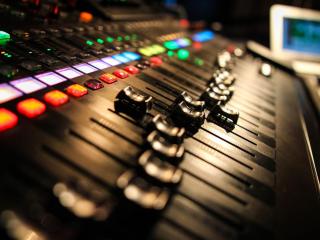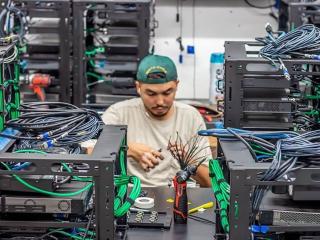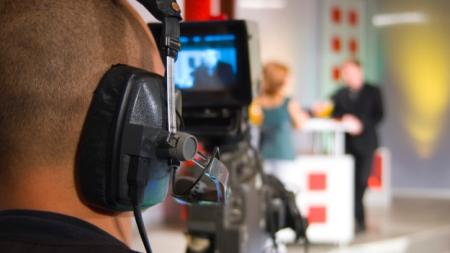
When you settle down at your favorite movie theater on Friday night to watch the newest movie release, do you ever reflect on the actual images you are viewing.
Probably not. Unless you are interested in becoming the person responsible for those images being recorded, edited, and presented to the world for viewing, chances are you just sit back, eat your popcorn, and enjoy the storyline; and that is exactly the goal of those behind the scenes.
The images that appear in movies, on television, and in videos (even those streaming online) come from the hard work of a camera operator. Images are recorded to inform and entertain, and are intended to hold an audience’s interest throughout the entire production.
Many people do not understand what an integral part of the film and television industries camera operators are. There is more to it that setting up and a camera and pushing ‘Record’.
If you are interested in becoming a camera operator, keep reading to find out what that entails and see how The Sheffield Institute of the Recording Arts is set up to help you prepare for an exciting career in the video production industry.
What is a Camera Operator?
Camera operators are people who capture a wide range of material in the form of images to be used on television shows, motion pictures, music videos, documentaries, new stations, sporting events, and so much more.
There are three commonly known types of camera operators that perform similar duties but in very different environments:
1. Studio Camera Operator
Typically working in a broadcast studio, studio camera operators record their subjects from a fixed position such as a stage or set. As an entry-level position, the director usually guides the camera operator as to what the shot order is, what the angles should be, and who to focus on at any given time.
Oftentimes, a studio camera operator has the chance to practice the order of shots to be videotaped before the show is filmed. However, the ability to improvise is important as things can change quickly during production, especially during a live recording.
2. Electronic News Gathering Operator
This camera operator is normally found working with a reporting team. They follow reporters who are delivering breaking news stories and often film the stories live as they unfold live.
Anticipating action is a key skill when you are an electronic news gathering operator. Sometimes the footage is shot live, although many times it is sent back to a broadcast studio and edited for a later showing.
3. Cinematographer
The most coveted camera operator position is that of the cinematographer. Working in the motion picture and film industries, cinematographers use stationary cameras, cameras mounted on tracks that move, or even control cranes that hold camera equipment above a scene for recording. There are several specializations in the field of cinematography such as only filming motion pictures, cartoons, or even being solely responsible for special effects.
More than Just a Little Red Light
Being a camera operator, regardless of which type, requires more than just setting up a camera and pushing ‘Record’. There is an art form to capturing compelling imagery that an intended audience will be drawn to.
Knowledge about Equipment
Camera operators must be able to use cutting edge equipment to get great shots. Expertise in the setup, assembly, and travel requirements for equipment is crucial for any camera operator, especially those that frequently travel to specific locales for filming.
Ability to Work Digitally
These days, digital cameras are the norm. More angles to choose from add a flexibility traditional film cameras do not have. Rather than dealing with the loading of film and changing out lenses, camera operators and their assistants will download digital images and manipulate them using software. Plus, digital cameras offer directors on-the-spot knowledge about whether a scene is completed or needs to be re-shot.
Interpersonal Skills with a Team
A film production of any kind, whether large scale or small, will include a team of industry experts all striving to make a finished product. Every member will have their own role to fulfill and camera operators must be able to work with all of them. Lighting and sound crews, directors, actors, witnesses, and more all have their own personalities. You have to be able to get along with everyone involved and follow direction, while also taking the lead. It is a delicate balance.
Creativity
As with most recording arts careers a camera operator must be able to think out of the box. Using your knowledge, skills, and experience, you should be able to offer solutions or creative changes to a particular shot at any moment. This is especially helpful when working one-on-one with the director. Deciding on an overall vision, discussing filming and editing techniques, and choosing the right equipment to get the most unique footage possible are just some examples.
Daring Sense of Adventure
Does this sound dramatic? Well, if you are a travelling camera operator, you will find quickly this is no exaggeration.
Dangerous countries, severe weather conditions, military conflicts, natural disasters, and diverse cultures will be just some of the things you experience while filming on set around the world. And sometimes you will be required to stay in a foreign place for a significant amount of time while covering a particular story or filming a motion picture. Be prepared.
As you can see, being a camera operator is about more than just watching a little red light capture what is in front of the camera. That is what makes this career choice so appealing to so many people.
Becoming a Camera Operator
Landing a job in the film industry is no easy task, and can be a dream that many people pursue and never achieve in their lifetime. However, with the right training and a solid education, becoming a camera operator can become a reality for you.
As the need for camera operators increases yearly at far above the national average for all career industries (think 11% versus the average 7% increase!), your chances of breaking into the film industry have never been better.
If you are in the Maryland area and are looking for a highly respected and quality recording school where you can become qualified as a camera operator, consider contacting The Sheffield Institute for the Recording Arts. The VideoWorks program that is available will have you trained in both the business and hands-on aspects required for a lucrative career as a camera operator.
Our comprehensive courses provide students with the essential tools they need to help them land a career in the film industry, including networking opportunities, training from industry experts, and even a dedicated career services team to help you snag a job right after graduation. With such a wide range of audio video expertise, Sheffield is sure to prepare you to be competitive amongst those vying for the same camera operator jobs.
Contact us today and make your dreams a reality!



